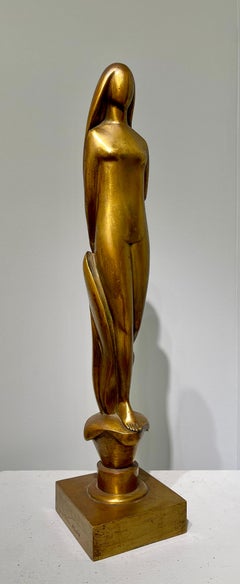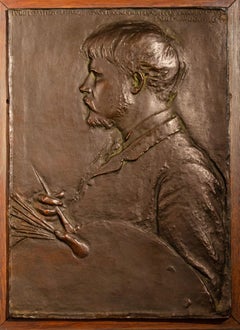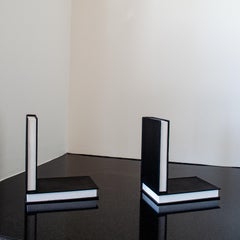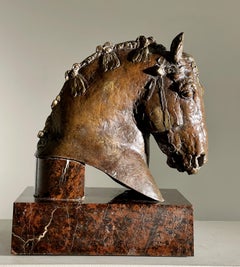Want more images or videos?
Request additional images or videos from the seller
1 of 2
Harriet Whitney Frishmuth"Crest of the Wave" Harriet Whitney Frishmuth, Bronze Nude Figurative Sculpture1926
1926
About the Item
- Creator:Harriet Whitney Frishmuth (1880 - 1980)
- Creation Year:1926
- Dimensions:Height: 66 in (167.64 cm)Width: 16 in (40.64 cm)Depth: 15 in (38.1 cm)
- Medium:
- Movement & Style:
- Period:
- Condition:
- Gallery Location:New York, NY
- Reference Number:1stDibs: LU1841212367662
About the Seller
5.0
Platinum Seller
Premium sellers with a 4.7+ rating and 24-hour response times
Established in 2022
1stDibs seller since 2022
122 sales on 1stDibs
Authenticity Guarantee
In the unlikely event there’s an issue with an item’s authenticity, contact us within 1 year for a full refund. DetailsMoney-Back Guarantee
If your item is not as described, is damaged in transit, or does not arrive, contact us within 7 days for a full refund. Details24-Hour Cancellation
You have a 24-hour grace period in which to reconsider your purchase, with no questions asked.Vetted Professional Sellers
Our world-class sellers must adhere to strict standards for service and quality, maintaining the integrity of our listings.Price-Match Guarantee
If you find that a seller listed the same item for a lower price elsewhere, we’ll match it.Trusted Global Delivery
Our best-in-class carrier network provides specialized shipping options worldwide, including custom delivery.You May Also Like
Eugene Marioton - Bronze Statue
By Eugene Marioton
Located in Berlin, DE
Eugène Marioton
französisch, 1854 - 1933
Muscular Nude Male Bronze Eugene Marioton - Bronze Statue, um 1900
A handsome and very fit partially draped young nude male with rippling mu...
Category
19th Century Jugendstil Figurative Sculptures
Materials
Bronze
Figurative bronze with a literary mythological theme from the early twentieth century
Located in Florence, IT
Early 20th-century Art Nouveau decorative bronze depicting a smiling mermaid carried by a wave above a fountain with a mask.
The reference is to the fairy tale by writer Hans Christ...
Category
Early 20th Century Art Nouveau Nude Sculptures
Materials
Bronze
$2,166
H 9.45 in Dm 7.09 in
Antique Orientalist Arab Slave Trader Female Nude Group Cold Painted Bronze 1910
By Franz Bergmann
Located in Portland, OR
A very large 24" (61cm) Franz Xavier Bergmann (1861-1936) cold painted bronze group statue, signed, Austria, circa 1910.
The bronze in the Orientalist manner & depicts a young slave ...
Category
1910s Art Nouveau Figurative Sculptures
Materials
Bronze
Franz BergmannAntique Orientalist Arab Slave Trader Female Nude Group Cold Painted Bronze 1910, 1910
$4,500
H 28 in W 11.75 in D 12 in
Jean Garnier Bronze of a Sea Nymph or Siren
By Jean Garnier
Located in San Francisco, CA
Jean Garnier (1853-1910) Art Nouveau Bronze Sculpture circa 1890s
A Fine bronze sculpture by listed French artist Jean Garnier.
A young nude woman with long flowing hair and a tamb...
Category
Late 19th Century Art Nouveau Nude Sculptures
Materials
Bronze
Leda and the Swan
Located in West Hollywood, CA
Presenting a magnificent early Art Nouveau bronze by Belgian artist Jef Lambeaux(1852-1908.)
“Leda and the Swan”, is an original Art Nouveau Bronze,...
Category
1880s Art Nouveau Figurative Sculptures
Materials
Bronze
The Secret
Located in PARIS, FR
The Secret
by Pierre-Félix FIX-MASSEAU (1869-1937)
Sculpture in bronze with a gilded patina
Signed on the side " Fix-Masseau "
Cast by " Siot-Paris " (with the foundry mark)
France...
Category
Late 19th Century Art Nouveau Figurative Sculptures
Materials
Bronze
Nature unveiling in front of Science
By Louis Ernest Barrias
Located in PARIS, FR
Nature unveiling in front of Science
by Louis-Ernest BARRIAS (1841-1905)
Bronze sculpture with triple patina, old-gilt, light brown and dark brown patina.
Signed on the side of the...
Category
Early 1900s Art Nouveau Nude Sculptures
Materials
Bronze
$12,635
H 10.87 in W 3.94 in D 2.76 in
Apple Dancer
By Jean-Léon Gérôme
Located in PARIS, FR
Apple Dancer
by Jean-Léon GEROME (1824-1904)
Bronze sculpture with a dual patina, brown and gilded
signed on the base "JL. GEROME"
cast by "Siot-Decauville Fondeur Paris" (foundry s...
Category
1890s Art Nouveau Figurative Sculptures
Materials
Bronze
The Song
By Félix Charpentier
Located in PARIS, FR
"The Song" by Félix Charpentier (1858-1924)
A very fine bronze sculpture with nuanced dark brown patina
Signed "Fx. Charpentier"
Cast by "E. Colin & Cie Paris"
France
around 1900
he...
Category
Early 1900s Art Nouveau Figurative Sculptures
Materials
Bronze
The Feeding / - Natural grace -
Located in Berlin, DE
Erich Schmidt-Kestner (1877 Berlin - 1941 Nordhausen), The Feeding, around 1915. Gold and black patinated bronze with cast brown patinated plinth mounted on a lightly veined black-gr...
Category
1910s Art Nouveau Nude Sculptures
Materials
Bronze
$4,332 Sale Price
20% Off
H 8.67 in W 8.67 in D 3.94 in
More From This Seller
View All"Young Woman Nude" Warren Wheelock, Art Deco, Modernist Female Sculpture Form
By Warren Wheelock
Located in New York, NY
Warren Wheelock
Untitled (Young Woman Nude), 1924
Incised signature and date to edge of base "© 1924 by Warren Wheelock"
Bronze
Sculpture: 20 h × 4½ w...
Category
1920s Art Deco Figurative Sculptures
Materials
Bronze
"Jules Bastien LePage" Augustus Saint-Gaudens, Bas Relief of French Painter
By Augustus Saint-Gaudens
Located in New York, NY
Augustus Saint-Gaudens
Jules Bastien LePage
Bronze
14 1/4 x 10 1/8 inches
Augustus Saint-Gaudens was born in 1848 in Dublin, Ireland. His father, Bern...
Category
1880s Realist Figurative Sculptures
Materials
Bronze
"Untitled (Bookends)" Steven Wolfe, Illusionistic Book Sculpture, Trompe-l'oeil
Located in New York, NY
Steven Wolfe
Untitled (Bookends), 1990
Stamped: SW 1990 2/3
Painted Bronze
6 1/4 x 7 x 4 inches
Edition 2/3
Steven Wolfe crafted sculptures and drawings of remarkable skill and vis...
Category
1990s Contemporary Figurative Sculptures
Materials
Bronze
"Sudbourne Premier: Suffolk Punch Stallion" Herbert Haseltine, 1927 Bronze
Located in New York, NY
Herbert Haseltine
Sudbourne Premier: Suffolk Punch Stallion, 1927
Signed left side: © HASELTINE / MCMXXVII
Bronze, dark brown patina, parcel gilding
...
Category
1920s Realist Figurative Sculptures
Materials
Bronze
"Dancer" David Hare, Male Nude, Figurative Sculpture, Mid-Century Surrealist
By David Hare
Located in New York, NY
David Hare
Dancer, circa 1955
Bronze with integral stand
68 high x 17 wide x 13 1/2 deep inches
“Freedom is what we want,” David Hare boldly stated in 1965, but then he added the caveat, “and what we are most afraid of.” No one could accuse David Hare of possessing such fear. Blithely unconcerned with the critics’ judgments, Hare flitted through most of the major art developments of the mid-twentieth century in the United States. He changed mediums several times; just when his fame as a sculptor had reached its apogee about 1960, he switched over to painting. Yet he remained attached to surrealism long after it had fallen out of official favor. “I can’t change what I do in order to fit what would make me popular,” he said. “Not because of moral reasons, but just because I can’t do it; I’m not interested in it.”
Hare was born in New York City in 1917; his family was both wealthy and familiar with the world of modern art. Meredith (1870-1932), his father, was a prominent corporate attorney. His mother, Elizabeth Sage Goodwin (1878-1948) was an art collector, a financial backer of the 1913 Armory Show, and a friend of artists such as Constantin Brancusi, Walt Kuhn, and Marcel Duchamp.
In the 1920s, the entire family moved to Santa Fe, New Mexico and later to Colorado Springs, in the hope that the change in altitude and climate would help to heal Meredith’s tuberculosis. In Colorado Springs, Elizabeth founded the Fountain Valley School where David attended high school after his father died in 1932. In the western United States, Hare developed a fascination for kachina dolls and other aspects of Native American culture that would become a recurring source of inspiration in his career.
After high school, Hare briefly attended Bard College (1936-37) in Annandale-on-Hudson. At a loss as to what to do next, he parlayed his mother’s contacts into opening a commercial photography studio and began dabbling in color photography, still a rarity at the time [Kodachrome was introduced in 1935]. At age 22, Hare had his first solo exhibition at Walker Gallery in New York City; his 30 color photographs included one of President Franklin Roosevelt.
As a photographer, Hare experimented with an automatist technique called “heatage” (or “melted negatives”) in which he heated the negative in order to distort the image. Hare described them as “antagonisms of matter.” The final products were usually abstractions tending towards surrealism and similar to processes used by Man Ray, Raoul Ubac, and Wolfgang Paalen.
In 1940, Hare moved to Roxbury, CT, where he fraternized with neighboring artists such as Alexander Calder and Arshile Gorky, as well as Yves Tanguy who was married to Hare’s cousin Kay Sage, and the art dealer Julian Levy. The same year, Hare received a commission from the American Museum of Natural History to document the Pueblo Indians. He traveled to Santa Fe and, for several months, he took portrait photographs of members of the Hopi, Navajo, and Zuni tribes that were published in book form in 1941.
World War II turned Hare’s life upside down. He became a conduit in the exchange of artistic and intellectual ideas between U.S. artists and the surrealist émigrés fleeing Europe. In 1942, Hare befriended Andre Breton, the principal theorist of surrealism. When Breton wanted to publish a magazine to promote the movement in the United States, he could not serve as an editor because he was a foreign national. Instead, Breton selected Hare to edit the journal, entitled VVV [shorth for “Victory, Victory, Victory”], which ran for four issues (the second and third issues were printed as a single volume) from June 1942 to February 1944. Each edition of VVV focused on “poetry, plastic arts, anthropology, sociology, (and) psychology,” and was extensively illustrated by surrealist artists including Giorgio de Chirico, Roberto Matta, and Yves Tanguy; Max Ernst and Marcel Duchamp served as editorial advisors.
At the suggestion of Jacqueline Lamba...
Category
1950s Abstract Figurative Sculptures
Materials
Bronze
$20,000 Sale Price
20% Off
"Reclining Woman" Karl Bitter, Reclining Woman with Reddish Patina
Located in New York, NY
Karl Bitter
Reclining Woman, 1897
Signed: Bitter 97
Stamped: GORHAM M F G CO.
Bronze
10.25 x 10.25 x 4 inches
Initially from Vienna, Karl Bitter first studied art at the city’s Kunstgewerbeschule and the Kunstakademie before being drafted into the Austrian army. He deserted his position in the military while on leave, and departed for New York City where he would discover considerable success. Early on, he won a competition for the Astor memorial bronze gates at Trinity Church, which awarded him enough capital to open his own studio. He went on to execute sculptures of Alexander Hamilton and Thomas Jefferson at the Cuyahoga Courthouse in Cleveland; he also created portraits of Jefferson for the state of Missouri and the University of Virginia. These commissions caught the attention of sculptor Richard Morris Hunt (who famously designed the façade of the Metropolitan Museum), earning Bitter the duty of producing the portrait medallions that now appear near the top of the museum’s grand face.
Notably, he presented at Chicago’s 1893 World’s Columbian Exposition and directed the Pan-American Exposition in Buffalo in 1901. Over his career, his artwork became more flexible – his early academy training is easily identifiable within his work, but after moving to America, conventions of Modernism became more prevalent within his sculpture. In addition to many awards, Bitter presided over the National Sculpture Society in 1906-1907, and was a member of the National Institute of Arts and Sciences, the National Academy of Design, the American Academy of Arts and Letters, the Architectural League, and the Art Commission, New York. His public work can be found at the Biltmore Estate, Asheville, NC; Gettysburg National Military Park, Gettysburg, PA; Wisconsin State Capitol, Madison, WI; United States Naval Academy...
Category
1890s Realist Figurative Sculptures
Materials
Bronze
Recently Viewed
View AllMore Ways To Browse
Art Nouveau Bronze Nude
Frishmuth Bronze
Harriet Whitney Frishmuth
Harriet Whitney Frishmuth Bronze Crest Of The Wave
Leonard Baskin Bronze Sculpture
Leonard Baskin Bronze
Lolly Pop
Marshall Fredericks
Martin Eichinger
Matteo Mauro
Maurice Duchin
Mr Imagination
Nude Fun
Nureyev Bronze
Outdoor Pop Art Sculptures
Picasso Terracotta Tile
Pop Art Sculpture Figures
Rachel Ann Stevenson



